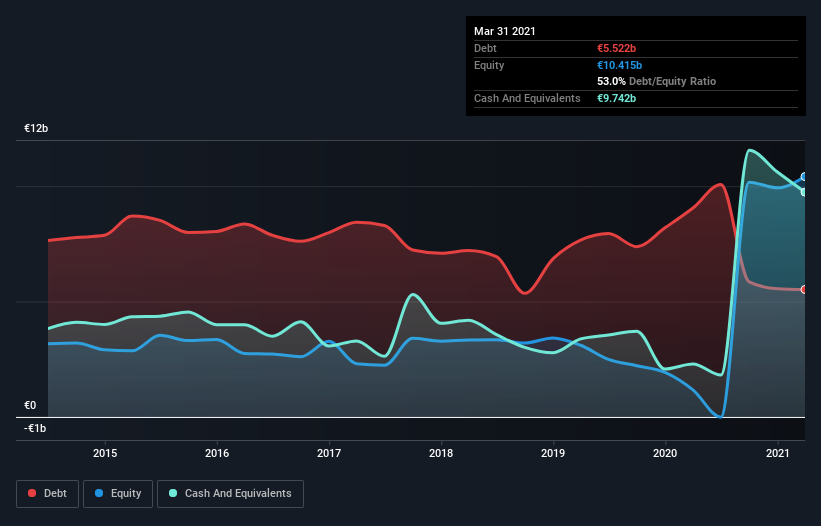
Some say volatility, rather than debt, is the best way to think about risk as an investor, but Warren Buffett famously said that 'Volatility is far from synonymous with risk.' When we think about how risky a company is, we always like to look at its use of debt, since debt overload can lead to ruin. We note that thyssenkrupp AG (ETR:TKA) does have debt on its balance sheet. But the more important question is: how much risk is that debt creating?
Why Does Debt Bring Risk?
Generally speaking, debt only becomes a real problem when a company can't easily pay it off, either by raising capital or with its own cash flow. Part and parcel of capitalism is the process of 'creative destruction' where failed businesses are mercilessly liquidated by their bankers. While that is not too common, we often do see indebted companies permanently diluting shareholders because lenders force them to raise capital at a distressed price. Of course, debt can be an important tool in businesses, particularly capital heavy businesses. When we think about a company's use of debt, we first look at cash and debt together.
Check out our latest analysis for thyssenkrupp
What Is thyssenkrupp's Debt?
The image below, which you can click on for greater detail, shows that thyssenkrupp had debt of €4.88b at the end of March 2021, a reduction from €9.05b over a year. But it also has €9.74b in cash to offset that, meaning it has €4.87b net cash.

A Look At thyssenkrupp's Liabilities
The latest balance sheet data shows that thyssenkrupp had liabilities of €12.6b due within a year, and liabilities of €13.2b falling due after that. Offsetting this, it had €9.74b in cash and €7.04b in receivables that were due within 12 months. So its liabilities total €8.93b more than the combination of its cash and short-term receivables.
Given this deficit is actually higher than the company's market capitalization of €6.14b, we think shareholders really should watch thyssenkrupp's debt levels, like a parent watching their child ride a bike for the first time. In the scenario where the company had to clean up its balance sheet quickly, it seems likely shareholders would suffer extensive dilution. thyssenkrupp boasts net cash, so it's fair to say it does not have a heavy debt load, even if it does have very significant liabilities, in total. The balance sheet is clearly the area to focus on when you are analysing debt. But ultimately the future profitability of the business will decide if thyssenkrupp can strengthen its balance sheet over time. So if you're focused on the future you can check out this free report showing analyst profit forecasts.
In the last year thyssenkrupp had a loss before interest and tax, and actually shrunk its revenue by 13%, to €29b. We would much prefer see growth.
So How Risky Is thyssenkrupp?
Statistically speaking companies that lose money are riskier than those that make money. And the fact is that over the last twelve months thyssenkrupp lost money at the earnings before interest and tax (EBIT) line. And over the same period it saw negative free cash outflow of €2.8b and booked a €4.7b accounting loss. But at least it has €4.87b on the balance sheet to spend on growth, near-term. Summing up, we're a little skeptical of this one, as it seems fairly risky in the absence of free cashflow. When we look at a riskier company, we like to check how their profits (or losses) are trending over time. Today, we're providing readers this interactive graph showing how thyssenkrupp's profit, revenue, and operating cashflow have changed over the last few years.
At the end of the day, it's often better to focus on companies that are free from net debt. You can access our special list of such companies (all with a track record of profit growth). It's free.
When trading thyssenkrupp or any other investment, use the platform considered by many to be the Professional's Gateway to the Worlds Market, Interactive Brokers. You get the lowest-cost* trading on stocks, options, futures, forex, bonds and funds worldwide from a single integrated account. Promoted
If you're looking to trade thyssenkrupp, open an account with the lowest-cost platform trusted by professionals, Interactive Brokers.
With clients in over 200 countries and territories, and access to 160 markets, IBKR lets you trade stocks, options, futures, forex, bonds and funds from a single integrated account.
Enjoy no hidden fees, no account minimums, and FX conversion rates as low as 0.03%, far better than what most brokers offer.
Sponsored ContentNew: Manage All Your Stock Portfolios in One Place
We've created the ultimate portfolio companion for stock investors, and it's free.
• Connect an unlimited number of Portfolios and see your total in one currency
• Be alerted to new Warning Signs or Risks via email or mobile
• Track the Fair Value of your stocks
This article by Simply Wall St is general in nature. It does not constitute a recommendation to buy or sell any stock, and does not take account of your objectives, or your financial situation. We aim to bring you long-term focused analysis driven by fundamental data. Note that our analysis may not factor in the latest price-sensitive company announcements or qualitative material. Simply Wall St has no position in any stocks mentioned.
*Interactive Brokers Rated Lowest Cost Broker by StockBrokers.com Annual Online Review 2020
Have feedback on this article? Concerned about the content? Get in touch with us directly. Alternatively, email editorial-team (at) simplywallst.com.
About XTRA:TKA
thyssenkrupp
Operates as an industrial and technology company in Germany and internationally.
Flawless balance sheet and undervalued.
Similar Companies
Market Insights
Community Narratives



